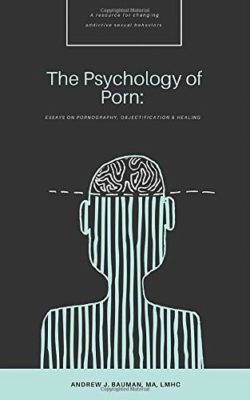 By Andrew Bauman
By Andrew Bauman
“Getting off is getting off, it doesn’t matter how,” he said with a smirk. “I mean, I’m not gay, I just like busting a nut and don’t care how it happens.” My client’s crude demeanor was no surprise, considering his unwavering narcissism and complete shamelessness. I listened as he described his dilemma: He had received blow jobs from men in the bathroom of a local Walmart, and his wife found out about it. She’d accused him of being gay; yes, somehow, the couple thought “being gay” was the problem, rather than his betrayal of their marriage vows and completely warped ideas of sexuality.
When sexuality is engaged with in extremes, sacredness is lost. Sex becomes a commodity that is either indulged or avoided; on one side, rigidity replaces righteousness; on the other, all boundaries and bodily wisdom are disregarded for cheap pleasure in the name of sexual liberation. Regardless of which extreme is chosen, intimacy and connection are forfeited for an unbalanced adherence to an ideal, which inevitably results in being bound by stronger chains.
In the conservative evangelical culture I grew up in, a sex-negative approach was their chosen method of sex (mis)education. Their ideology of sexuality was an attempt to avoid the complexities of the topic altogether, control and repress desire, and create an environment of fear and rigidity. Unfortunately, fear and shame are terrible motivators for healthy behavior and, much more often than not, create the exact opposite effect, making sexual commodification worse. There is often great arousal found within the act of rebellion. What I have learned over the past decade working with men and their sexual restoration is that neither shame nor shamelessness is the answer to sexual wholeness. Both extremes miss the point entirely.
The typical conservative approach that tends to be more shame-based and sex-negative has horrific consequences, as Tina Sellers notes:
When people are filled with shame and self-loathing, their affected self-esteem takes precedence in interactions with others. It dominates and eclipses a person’s ability to see and love another. In essence, sexuality encased in silence and shame keeps people from intimately knowing both God and each other and cripples our ability as a community of believers to truly love and be a healing force in a hurting world.
The other extreme, which I will address here as “shamelessness,” has become popular in progressive circles recently. This approach to sexuality is a reactive counter-response to the toxic, shame-driven narrative promoted by more conservative ideologies. I am thinking of the stories I have heard from one of those “liberated” progressive seminaries, where a couple of the students decided to “mark” certain areas of the campus by having sexual intercourse. This is not liberation, but a form of adolescent rebellion which stems from immense wounding and unaddressed heartache. Many of these folks take their painful stories and sprint toward the other extreme in pursuit of a radical escape from toxic shame, yet in that noble plight they end up cheapening sex and making it less than a sacred act of love. Another example is the pro-porn progressives and therapists that I run into all the time. I believe they are well-intentioned, but merely focusing on shame reduction is to misunderstand healthy sexual reconstruction and wholeness. As relationship coach and anti-porn activist Jessica Bahr states:
A therapist helping a client learn how to successfully navigate porn use is like a nutritionist helping a client navigate how to successfully eat fast food. “Here, let me show you the ‘right’ way to use something toxic.” The problem is, changing your food palate AND your body after a poor diet (as hard as that is) is much easier than changing your sexual template/what your brain is wired to get aroused by. And of course it doesn’t just affect the consumer, but his/her current and future partners. This misguidedness takes an important part of a love relationship, one that bonds and connects two people – physical intimacy – and replaces it with something so fake and so far removed from the person and his/her partner, so far removed from love and intimacy and actual mutual pleasure and desire, that it can’t even be called a bad surrogate.
Pastor and theologian Nadia Bolz-Weber, whose work I have historically respected, has misconstrued sexual liberation in her new book Shameless: A Sexual Reformation. She says:
I’m here to tell you: unless your sexual desires are for minors or animals, or your sexual choices are hurting you or those you love, those desires are not something you need to “struggle with.” They are something to listen to, make decisions about, explore, perhaps have caution about. But struggle with? Fight against? Make enemies of? No.
Yes, we must make peace with our sexuality and no longer demonize it, with that I wholeheartedly agree. But Bolz-Weber loses me with the phrase, “Unless your sexual desire are…hurting you.” You see, porn use is a direct way that we hurt ourselves. I am not just talking about religious shame (though that was clearly a factor in my story of sexuality), but porn also damaged me because I developed a Pornographic Style of Relating (PSR), which made the way I related to women a nightmare (for both me and the women). Porn groomed me to seduce and consume beauty rather than delight in and honor it. I was drawn to the quick highs of infatuation rather than the slow and steady development of a long-lasting relationship.
Bolz-Weber adds the other caveat, “Unless your sexual desires are hurting … those you love.” If your porn use feeds a false intimacy, then wouldn’t your inability to genuinely connect with those you love directly hurt them? And what about those you don’t necessarily love; are they okay to hurt? For example, the women who your porn use helps continue to enslave? It’s supply and demand: The more you look, creating a demand, the more the porn industry must supply. When you peruse the rape, incest, or “young Asian women” categories, for example, then these are the women who will be exploited and trafficked to supply your demand.
Our sexual ethic must not be based in extremes or either-or. “Shame-based” and “shamelessness” are both terrible choices. We must learn to live in the tension of a middle ground that is based in honor of the Imago Dei; God in the face of all human beings.
***
This blog was originally published at https://andrewjbauman.com/shame-vs-shamelessness/. It is reprinted here with the author’s permission.
***

Andrew J. Bauman is Co-Founder & Director of the Christian Counseling Center: For Sexual Health & Trauma (CCC). He is a licensed mental health counselor with a Master of Arts in Counseling Psychology from The Seattle School of Theology & Psychology. He is currently working on his doctorate from Northeastern University. Andrew is the author of four books, Floating Away: A Book to Help Children Understand Addiction, Stumbling Toward Wholeness, The Psychology of Porn, and (with his wife, Christy) A Brave Lament. You can find out more about his work at www.andrewjbauman.com and www.ChristianCC.Org.
